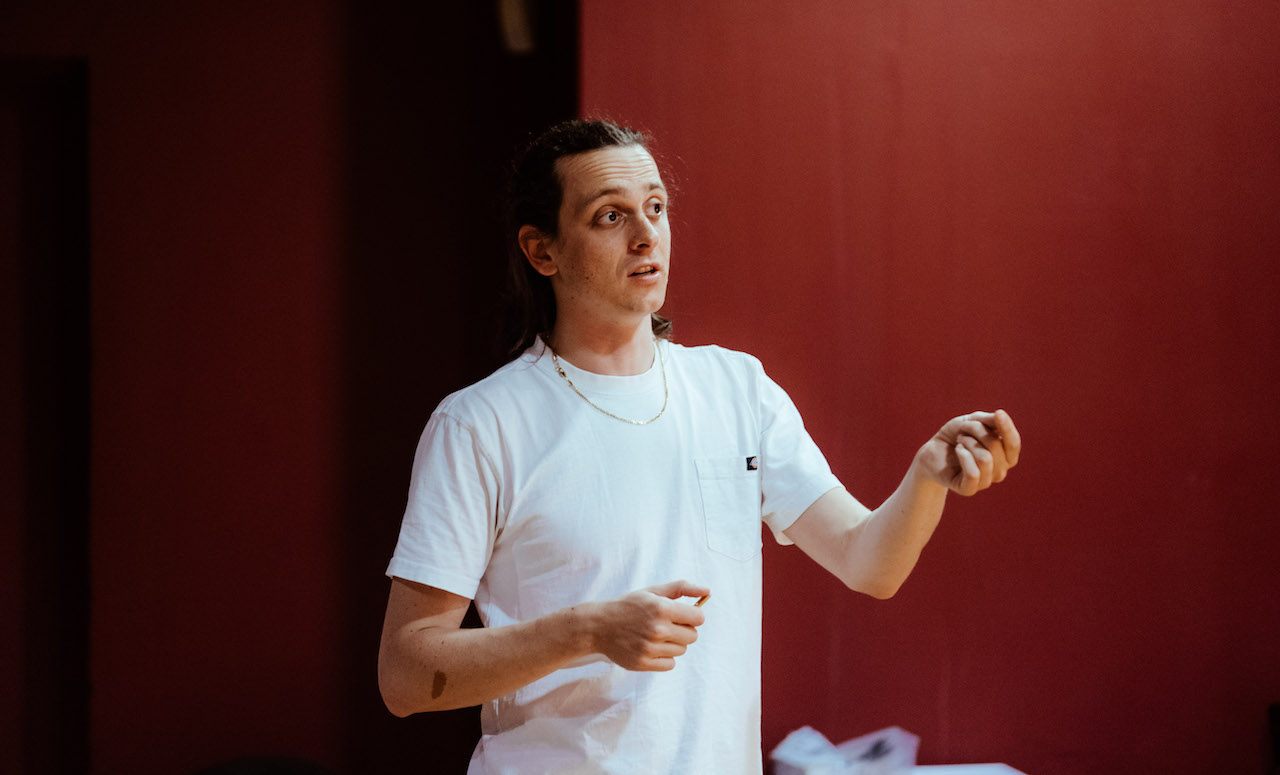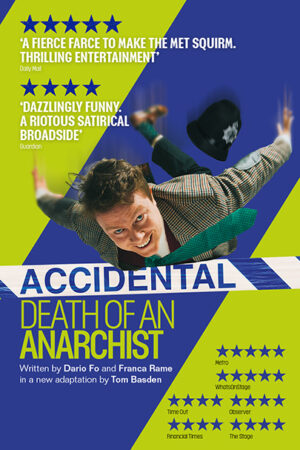“An argument for just how special theatre is, in all its liveness”: Director Daniel Raggett on Accidental Death of an Anarchist

Daniel Raggett is a director who has worked extensively on productions at the National Theatre, in the West End and on Broadway. He directed Anna X by Joseph Charlton, which starred Golden Globe award-winner Emma Corrin in the title role. Recently he collaborated with comedy writer Tom Basden to bring to the stage Basden’s adaptation of Dario Fo and Franca Rame’s Accidental Death of an Anarchist, with BAFTA Award-winning actor Daniel Rigby starring in the main role as The Maniac. The Upcoming caught up with Raggett to find out how he breathed new life into this version of the classic satirical farce, relocating it to contemporary London.
How would you describe Accidental Death of An Anarchist to those who are unfamiliar with it?
Accidental Death of an Anarchist is a farce in which a man, known as The Maniac, is arrested for impersonation and taken to a police station. At the police station, he learns of an inquiry happening into the death of a suspect in custody, which was likely perpetrated by the police. He then leads the police officers on a flight of fancy where he tricks them into revealing the cover-ups and collusion they’ve engaged in, in order to get away with the murder. It’s very funny, with an incredible central performance from Daniel Rigby as The Maniac – but has at its core the exploration of a very important issue: deaths at the hands of the police.
What is your relationship or connection with the source material? How and when did you first come across the text?
Tom Basden introduced me to the text when we had a conversation about me directing the play. I was immediately fascinated with the material as it was based on the transcripts of an original case of a man named Giuseppe Pinelli. In 1969, Pinelli was wrongly arrested and then killed by police officers in Milan. These officers then proceeded to cover up their crime. The hook for me was the challenge of taking a serious subject and exploring it through a comic lens. It seems at odds with the gravity of the subject matter, yet somehow it becomes even more impactful. Tom’s adaptation is incredibly funny and one of the only scripts that’s made me laugh out loud whilst reading it – and yet it still remains deeply political.
The play was written during Italy’s infamous Years of Lead; Dario Fo was even prosecuted and forced to go abroad. How does it feel to revive this story for an audience of today, knowing the context in which it was written and what it cost to originally bring it to the stage?
Dario Fo himself talked about how satire was the first thing that was suppressed by governments. Italy in the early 70s was, of course, a different place to the UK in the 2020s, however, the issue of deaths in police custody is very pertinent today. You can definitely draw parallels between the original and now – in fact, it’s not that much of a reach when you read the headlines, particularly following the Casey Report about the various failings, abuses and out-and-out criminality of the Met police. In terms of the suppression Fo endured, I’m sure the new Public Order Act is the beginning of a slippery slope towards a similar situation.
Adaptation is a complex process in which different minds and creative visions meet and inform each other – writers, directors, and actors. In this case, you had to instil new life into a play originally written in the 70s and in Italian, and then adapted by Tom Basden. I imagine this must have been a highly collaborative process. What was your initial approach to giving life to Basden’s version?
Yes, the process was highly collaborative. When I’m working on a new play, I usually like the writer to be there as much as possible and Tom was very present. When we had the company together, we spent a lot of time throwing around ideas and shading in the characters. The key thing for me was to treat it like a play – to find truth in the characters and the situations, and not try to think of it as a series of gags. If you don’t try to find a truthful grounding for the story then the audience feels no stakes and no investment in what they’re watching. It may be a collection of individual funny moments, a sketch show, but it won’t amount to a collective whole.
Which aspects of the text lent themselves most easily to being reinterpreted through a modern lens? And which presented the biggest challenges?
The core subject was the easiest to reinterpret for a modern lens because police still kill people, and more frequently than we’re aware of – or, in the UK, would like to think. When Fo premiered the play he was writing about the Italy around him, so he was adamant that when you adapt it, you change the context so that it’s about the society and the world in which the audience are watching the play. If you don’t do this it would be a piece of historical theatre and it wouldn’t fulfil its purpose. The most difficult thing is keeping the modern references relevant because it’s remarkable how quickly things shift and change. The reference to Love Island has been pretty enduring, but there have been other areas, particularly with the revolving door of politicians coming and going, where we’ve had to shift a lot.
What would you like the audience to take home with them after watching the play?
The primary thing that I want audiences to take home is that they’ve had a really great evening – that they’ve watched a show that has entertained them and made them laugh a lot; an evening that makes an argument for just how special theatre is, in all its liveness; an argument for the pleasure of sitting in the dark and laughing along to something with total strangers. And, within that, they may also learn something in the process and leave the theatre with a few new thoughts, ideas or questions in their head.
Why should we all go and see it?
Because it’s a rare piece of theatre which manages to combine hilarious performances and an incredibly sharp script with an issue at its heart that has real import. All these ingredients combined make for something very unique.
Are there any other adaptations that you would particularly like to direct and bring to the stage in the future?
I directed a production of Anna Karenina at a drama school a couple years ago that I was very proud of and would love to bring to a larger stage. I’ve also harboured a dream for many years of directing a production of my favourite book, Middlemarch.
Are there any other projects that you’re currently involved in and can share with us?
I directed a production of The Vortex at Chichester Festival Theatre with Lia Williams and Joshua James earlier this year and I’m hoping that will find its way back to the stage in the not too distant future.
Benedetta Mancusi
Photo: Helen Murray
Accidental Death of an Anarchist is on at Theatre Royal Haymarket from 12th June until 9th September 2023. For further information or to book visit the theatre’s website here.


























Facebook
Twitter
Instagram
YouTube
RSS